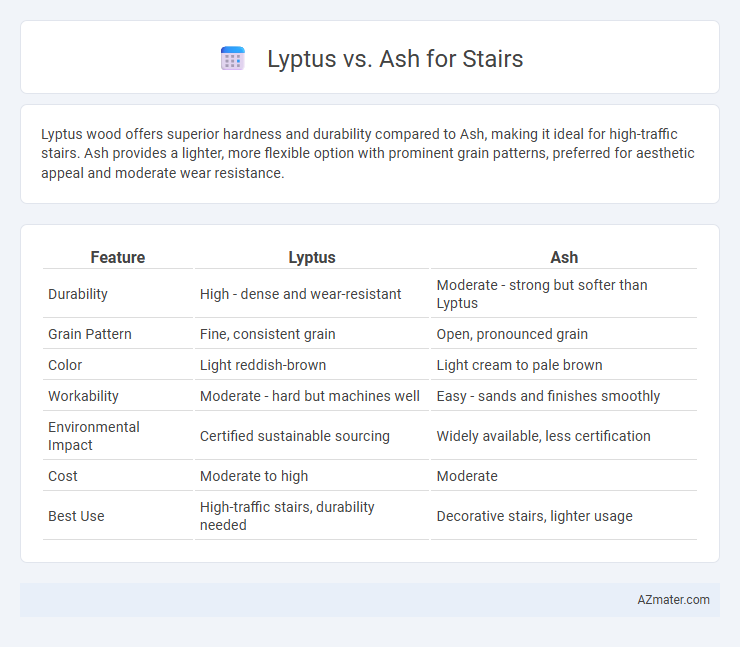Lyptus wood offers superior hardness and durability compared to Ash, making it ideal for high-traffic stairs. Ash provides a lighter, more flexible option with prominent grain patterns, preferred for aesthetic appeal and moderate wear resistance.
Table of Comparison
| Feature | Lyptus | Ash |
|---|---|---|
| Durability | High - dense and wear-resistant | Moderate - strong but softer than Lyptus |
| Grain Pattern | Fine, consistent grain | Open, pronounced grain |
| Color | Light reddish-brown | Light cream to pale brown |
| Workability | Moderate - hard but machines well | Easy - sands and finishes smoothly |
| Environmental Impact | Certified sustainable sourcing | Widely available, less certification |
| Cost | Moderate to high | Moderate |
| Best Use | High-traffic stairs, durability needed | Decorative stairs, lighter usage |
Introduction to Lyptus and Ash Wood for Stairs
Lyptus wood, a hybrid hardwood derived from Eucalyptus species, offers exceptional durability and a fine, consistent grain ideal for stair construction. Ash wood is renowned for its strength, shock resistance, and light color with pronounced grain patterns, making it a popular choice for stairs requiring both aesthetics and functionality. Both Lyptus and Ash provide reliable structural integrity, but Lyptus excels in sustainability and uniformity, while Ash is valued for classic appeal and resilience.
Appearance and Grain Patterns: Lyptus vs Ash
Lyptus offers a uniform, fine grain pattern with warm reddish-brown tones, creating a smooth and contemporary look ideal for modern stair designs. Ash features a lighter, creamy color with prominent, straight grain patterns that emphasize a natural and classic aesthetic, perfect for traditional or rustic staircases. The distinct grain texture of ash generally appears more pronounced and textured compared to the subtle, consistent finish of lyptus wood.
Durability and Hardness Comparison
Lyptus, a hybrid hardwood derived from Eucalyptus trees, offers a Janka hardness rating of approximately 1,400, making it moderately durable for stair applications. Ash hardwood exceeds this with a Janka hardness of about 1,320 to 1,460, depending on the species, providing superior resistance to dents and wear under heavy foot traffic. Both woods are durable, but Ash typically delivers a harder, more wear-resistant surface, ideal for staircases requiring long-term toughness and resilience.
Cost Differences: Lyptus vs Ash Stair Materials
Lyptus stair materials typically cost less than ash due to faster growth cycles and sustainable harvesting practices, making Lyptus a budget-friendly option for stair construction. Ash wood, prized for its durability and attractive grain, tends to be more expensive because of slower growth and higher demand in the flooring and furniture industries. Choosing Lyptus can reduce overall project expenses without significantly compromising strength and aesthetics compared to traditional ash stairs.
Workability and Installation for Staircases
Lyptus offers superior workability for staircases due to its uniform grain and consistent hardness, allowing for precise cuts and smooth finishes. Ash is also highly workable, featuring a straight grain and good shock resistance, which makes it reliable for stair components requiring strength and flexibility. Both woods install efficiently, but Lyptus' predictable density reduces the risk of splitting during nailing and screwing, enhancing installation speed and accuracy.
Sustainability and Environmental Impact
Lyptus wood, a hybrid eucalyptus species, offers rapid growth and renewable harvesting, significantly reducing deforestation compared to traditional ash wood, which grows slower and requires longer cycles to replenish. The sustainable management of Lyptus plantations minimizes carbon footprint and soil erosion, while ash harvesting often involves older, less controlled forests that impact biodiversity. For eco-conscious stair projects, Lyptus provides a greener alternative with comparable durability and aesthetic appeal.
Maintenance and Longevity
Lyptus wood exhibits exceptional durability and resistance to scratches and dents, making it ideal for staircases that endure heavy foot traffic. Its closed-grain structure requires minimal maintenance, typically only regular cleaning and occasional refinishing to maintain appearance. Ash stairs, while robust and flexible, may need more frequent sealing and refinishing due to its open grain, which can absorb moisture and show wear faster, potentially reducing its long-term aesthetic appeal.
Best Uses and Design Considerations
Lyptus offers a hard, dense wood ideal for high-traffic stairs due to its durability and resistance to wear, while Ash provides a slightly softer yet strong material with excellent shock absorption suited for classic and contemporary stair designs. Lyptus features a consistent reddish-brown hue with fine grain, perfect for modern aesthetics and uniform finishes, whereas Ash displays a lighter color with pronounced grain patterns, enhancing traditional or rustic staircases. Choosing Lyptus supports sustainable forestry practices, appealing to eco-conscious projects, whereas Ash's natural elasticity makes it favorable for stairs requiring flexibility and long-term performance.
Pros and Cons: Lyptus vs Ash Stairs
Lyptus stairs offer high durability and resistance to wear due to their plantation-grown eucalyptus origins, making them an eco-friendly and cost-effective alternative to traditional hardwoods. Ash stairs provide a classic, light-toned appearance with excellent flexibility and shock resistance, ideal for high-traffic areas but may require more maintenance to prevent dents and scratches. While Lyptus is less prone to warping and insect damage, Ash remains favored for its natural grain beauty and ease of refinishing over time.
Conclusion: Which Wood is Better for Your Stairs?
Lyptus offers a durable, sustainable alternative with a fine, consistent grain and natural resistance to wear, making it ideal for high-traffic stairs. Ash provides excellent strength and a distinct, attractive grain pattern that adds character and complements both traditional and modern interiors. For long-lasting, eco-friendly stairs with uniform aesthetics, Lyptus is superior, while Ash suits those prioritizing classic appearance and natural variations.

Infographic: Lyptus vs Ash for Stair
 azmater.com
azmater.com